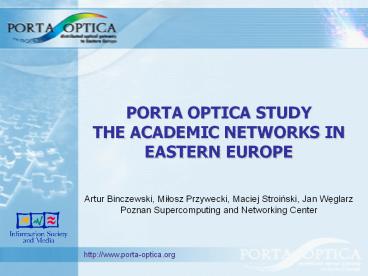General information Project description - PowerPoint PPT Presentation
1 / 27
Title:
General information Project description
Description:
Artur Binczewski, Milosz Przywecki, Maciej Stroinski, Jan Weglarz ... Intercity connections up to 8Mbps (Chisinau-Balti, radio-relay) ... – PowerPoint PPT presentation
Number of Views:57
Avg rating:3.0/5.0
Title: General information Project description
1
PORTA OPTICA STUDY THE ACADEMIC NETWORKS IN
EASTERN EUROPE Artur Binczewski, Milosz
Przywecki, Maciej Stroinski, Jan Weglarz Poznan
Supercomputing and Networking Center
http//www.porta-optica.org
2
Content
- Project overview
- Partners
- Main goal objectives
- Preliminary results
- Next steps
2/27
http//www.porta-optica.org
3
Overview
- Instrument SSA FP6
- Duration 1 year
- Start 01/02/2006
- End 31/01/2007
- 12 project partners
- 3 main regions
- Eastern Europe Belarus, Ukraine, Moldova
- Baltic states Estonia, Latvia, Lithuania
- Southern Caucasus Armenia, Azerbaijan, Georgia
3/27
http//www.porta-optica.org
4
Partners
4/24
4/27
4/11
5
Main Goal Objectives
- Main Goal
- Stimulation and consolidation of initiatives to
ensure the successful, dark-fiber based research
network deployment in the Eastern Europe, Baltic
states and Southern Caucasus regions - Objectives
- Identification of user communities and their
requirements - Assessment of fiber infrastructure availability
- Performing fiber network case studies and
deployment scenarios - Raising project awareness and results
dissemination
http//www.porta-optica.org
5/27
6
Estonia
Potential impact 11 cities 732 300 people 80
scientific institutions 50 higher education
institutions 69 114 university students
- EENET, Estonian NREN
- GÉANT2 connection 622 Mbps
- DF 1Gbps Tallin-Tartu, Tallin-Paide, Paide-Tartu
- All other links (2-11Mbps) using leased lines
http//www.porta-optica.org
6/27
7
Estonia
622Mbps GEANT2
4Mbps
4Mbps
11Mbps
1Gbps
2Mbps
1Gbps
4Mbps
4Mbps
8Mbps
2Mbps
2Mbps
DF 1Gbps Tallin-Tartu, Tallin-Paide, Paide-Tartu
http//www.porta-optica.org
7/27
8
Latvia
Potential impact 26 cities 1 462 000 people 89
scientific institutions 49 higher education
institutions 121 830 university students
- LATNET, Latvian NREN
- GÉANT2 connection 155 Mbps
- Backbone leased lines up to 2 Mbps
- Last mile fiber optic/radio connections/DSL
http//www.porta-optica.org
8/27
9
Latvia
http//www.porta-optica.org
9/27
10
Lithuania
Potential impact 22 cities 1 764 000 people 109
scientific institutions 25 higher education
institutions 137 732 university students
- LITNET, Lithuanian NREN
- GÉANT2 connection 1 Gbps now, soon 2.5 Gbps
- Backbone 1Gbps, 200Mbps, 4-30Mbs,
- Own or leased DF
http//www.porta-optica.org
10/27
11
Lithuania
1 Gbps
http//www.porta-optica.org
11/27
12
Belarus
Potential impact 6 cities 3 450 000 people 194
scientific institutions 44 higher education
institutions 273 000 university students
- BASNET, Belarusian NREN
- GÉANT2 connection 34 Mbps
- Backbone
- Minsk MAN FDDI ring 100Mbps
- Intitutions in Minsk connected via FO or radio
links - Other cities connected via 2Mbps leased lines
http//www.porta-optica.org
12/27
13
Ukraine
Potential impact 43 cities 19 517 000 people 600
scientific institutions 384 higher education
institutions 1 342 000 university students
- URAN, association of Ukrainian RENs
- No GÉANT2 connection (in progress)
- Leased channels between major cities
- 155Mbps (Kiev-Lviv), TDM
- 10 Mbps (Kiev-Odessa), Ethernet
- 128kbps-2Mbps (other cities), TDM
http//www.porta-optica.org
13/27
14
Ukraine
http//www.porta-optica.org
14/27
15
Moldova
Potential impact 7 cities 1 151 000 people 50
scientific institutions 35 higher education
institutions 78 500 university students
- RENAM, Moldavian NREN
- 16 Mbps GÉANT2 connection
- DF infrastructure in Chisinau (20km)
- Intercity connections up to 8Mbps
(Chisinau-Balti, radio-relay) - users connected to NREN using leased lines
(xDSL), radio links, Gigabit/Fast/Ethernet, WiFi)
http//www.porta-optica.org
15/27
16
Georgia
Potential impact 6 cities 1 481 000 people 48
scientific institutions 23 higher education
institutions 92 900 university students
- GRENA, Georgian NREN
- No GÉANT2 connection
- Backbone
- Tbilisi Gigabit Ethernet, DF, 15 km
- Regional infrastructure based on leased 2 Mbps
channels
http//www.porta-optica.org
16/27
17
Georgia
http//www.porta-optica.org
17/27
18
Azerbaijan
Potential impact 6 cities 3 634 000 people 186
scientific institutions 35 higher education
institutions 137 184 university students
- AzRENA/AzNET, Azerbaijani RENs
- No GÉANT2 connection,
- Academy of Science buildings in Baku - FO
infrastructure - Other institutions connected via radio links and
leased lines
http//www.porta-optica.org
18/27
19
Azerbaijan (AzRENA)
http//www.porta-optica.org
19/27
20
Azerbaijan (AzNET)
http//www.porta-optica.org
20/27
21
Armenia
Potential impact 8 cities 3 450 000 people 194
scientific institutions 44 higher education
institutions 273 000 university students
- ASnet/ARENA/ISOC/NFSATnet/LIBnet Armenian RENs
- No GÉANT2 connection
- 10Mbps FO connections between network nodes
- Institutions connected via FO, radio links and
DSL
http//www.porta-optica.org
21/27
22
Armenia
Gyumri
Yerevan
http//www.porta-optica.org
22/27
23
Potential beneficiaries Impact of work
- 9 beneficiary countries
- 1400 scientific institutions
- 700 higher education institutions,
- 2 525 260 students
- 135 cities
- 36 641 300 people
http//www.porta-optica.org
23/27
24
Potential beneficiariesExamples of main
scientific institutions
- Minsk, Unitary Enterprise Geoinformation
systems, United Institute of Informatics
Problems, Belarus (development of belorussian
space system of distance land exploration on the
base of belorussian space ship "BelKA") - Chisinau, Faculty of Radioelectronics and
Telecommunications of Technical University of
Moldova, (First GRID site in Moldova) - Kiev, V. M. Glushkov Institute of Cybernetics,
Ukraine, (developing system to control problems
within the framework of cluster technologies) - Tallinn, National Institute of Chemical Physics
and Biophysics, Estonia (development of novel
directions in material sciences, gene- and
biotechnology, environmental technology, and
computer science)
- Ventspils, Ventspils International Radioastronomy
Centre (VIRAC), Latvia
http//www.porta-optica.org
24/27
25
Summary
- GEANT2 connection 0 2.5Gbps
- Regional infrastructure based on low-speed leased
lines/DSL/radio - Research teams cannot effectively collaborate due
to lack of high-speed network infrastructure
http//www.porta-optica.org
25/27
26
Next steps
- July 2006, Users database published,
- October 2006, Analysis of deployment
opportunities ready - December 2006, Case studies ready,
- January 2006, Fiber optic development plan ready
http//www.porta-optica.org
26/27
27
- THANK YOU
27/27
http//www.porta-optica.org































